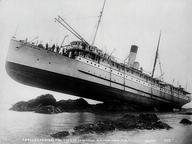Quiz Answer Key and Fun Facts
1. On January 16, Arthur Zimmermann, Foreign Minister of the German Empire sent a telegram that had a crucial effect on the course of World War I. To the government of what country was the message ultimately destined?
2. On January 25, the United States formally proclaimed its purchase of the Virgin Islands from what country?
3. On March 4, Jeannette Rankin became the first woman member of the United States House of Representatives. What state did she represent?
4. On April 9, a successful attack on German lines at Vimy Ridge outside of Arras was launched by troops primarily from what country?
5. Also on April 9, Vladimir Ilyich Lenin and several accomplices, sent by the German government to destabilize the Russian war effort, boarded a "sealed train" en route to Petrograd. From what city did this fateful trip originate?
6. On May 29, John F. Kennedy was born in what Massachusetts locality?
7. On July 4, the stirring words "Lafayette, we are here!" (sometimes attributed to General John J. Pershing, but now generally credited to one of his officers, Colonel Charles E. Stanton) were spoken at what place in France?
8. On July 31, an Allied offensive commenced the opening stages of the Third Battle of Ypres. By the name of what village is this costly battle more commonly known?
9. On November 7, the provisional government of Russia led by Premier Aleksandr Kerensky fell to the Bolsheviks led by Lenin. Kerensky and Lenin shared what home town on the Volga River?
10. On December 6, a French ammunition ship exploded, devastating what port city?
Source: Author
cobb367
This quiz was reviewed by FunTrivia editor
bloomsby before going online.
Any errors found in FunTrivia content are routinely corrected through our feedback system.
